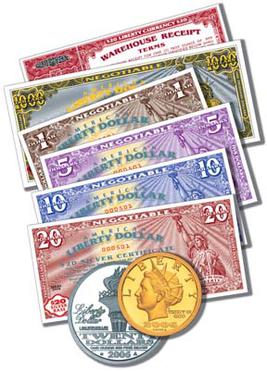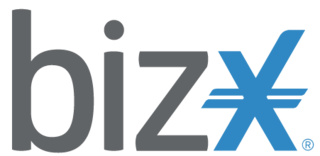
In trade, barter is a system of exchange in which participants in a transaction directly exchange goods or services for other goods or services without using a medium of exchange, such as money. Economists usually distinguish barter from gift economies in many ways; barter, for example, features immediate reciprocal exchange, not one delayed in time. Barter usually takes place on a bilateral basis, but may be multilateral. In most developed countries, barter usually exists parallel to monetary systems only to a very limited extent. Market actors use barter as a replacement for money as the method of exchange in times of monetary crisis, such as when currency becomes unstable or simply unavailable for conducting commerce.
A currency is a standardization of money in any form, in use or circulation as a medium of exchange, for example banknotes and coins. A more general definition is that a currency is a system of money in common use within a specific environment over time, especially for people in a nation state. Under this definition, the British Pound sterling (£), euros (€), Japanese yen (¥), and U.S. dollars (US$) are examples of (government-issued) fiat currencies. Currencies may act as stores of value and be traded between nations in foreign exchange markets, which determine the relative values of the different currencies. Currencies in this sense are either chosen by users or decreed by governments, and each type has limited boundaries of acceptance; i.e., legal tender laws may require a particular unit of account for payments to government agencies.
The Ithaca HOUR was a local currency used in Ithaca, New York, though it is now no longer in circulation. It was one of the longest-running local currency systems, and inspired other similar systems in Madison, Wisconsin; Santa Barbara, California; Corvallis, Oregon; and a proposed system in the Lehigh Valley, Pennsylvania. One Ithaca HOUR was valued at US$10 and was generally recommended to be used as payment for one hour's work, although the rate is negotiable.
In economics, a local currency is a currency that can be spent in a particular geographical locality at participating organisations. A regional currency is a form of local currency encompassing a larger geographical area, while a community currency might be local or be used for exchange within an online community. A local currency acts as a complementary currency to a national currency, rather than replacing it, and aims to encourage spending within a local community, especially with locally owned businesses. Such currencies may not be backed by a national government nor be legal tender. About 300 complementary currencies, including local currencies, are listed in the Complementary Currency Resource Center worldwide database.
A local exchange trading system is a locally initiated, democratically organised, not-for-profit community enterprise that provides a community information service and records transactions of members exchanging goods and services by using locally created currency. LETS allow people to negotiate the value of their own hours or services, and to keep wealth in the locality where it is created.

A scrip is any substitute for legal tender. It is often a form of credit. Scrips have been created and used for a variety of reasons, including exploitative payment of employees under truck systems; or for use in local commerce at times when regular currency was unavailable, for example in remote coal towns, military bases, ships on long voyages, or occupied countries in wartime. Besides company scrip, other forms of scrip include land scrip, vouchers, token coins such as subway tokens, IOUs, arcade tokens and tickets, and points on some credit cards.

The American Liberty Dollar (ALD) was a private currency produced in the United States.
Calgary Dollars is a local currency in Calgary, Alberta, Canada. While functioning as a limited form of currency within Calgary, it is not legal tender nor is it backed by a national government. Instead, the currency is intended as a tool for community economic development as well as a focus for community building and local resiliency.
A complementary currency is a currency or medium of exchange that is not necessarily a national currency, but that is thought of as supplementing or complementing national currencies. Complementary currencies are usually not legal tender and their use is based on agreement between the parties exchanging the currency. According to Jérôme Blanc of Laboratoire d'Économie de la Firme et des Institutions, complementary currencies aim to protect, stimulate or orientate the economy. They may also be used to advance particular social, environmental, or political goals.

The history of Chinese currency spans more than 3000 years. Currency of some type has been used in China since the Neolithic age which can be traced back to between 3000 and 4500 years ago. Cowry shells are believed to have been the earliest form of currency used in Central China, and were used during the Neolithic period.
A private currency is a currency issued by a private entity, be it an individual, a commercial business, a nonprofit or decentralized common enterprise. It is often contrasted with fiat currency issued by governments or central banks. In many countries, the issuance of private paper currencies and/or the minting of metal coins intended to be used as currency may even be a criminal act such as in the United States. Digital cryptocurrency is sometimes treated as an asset instead of a currency. Cryptocurrency is illegal as a currency in a few countries.
"Mutual credit" is a term mostly used in the field of complementary currencies to describe a common, usually small-scale, endogenous money system.

Money is any item or verifiable record that is generally accepted as payment for goods and services and repayment of debts, such as taxes, in a particular country or socio-economic context. The primary functions which distinguish money are: medium of exchange, a unit of account, a store of value and sometimes, a standard of deferred payment.

Edwin Clarence Riegel, generally known as E.C. Riegel, was an American author, consumer advocate and independent scholar who campaigned against restrictions on free markets that harmed consumers and promoted an alternative monetary theory and an early private enterprise currency alternative.

BizX is an American financial technology company that operates a digital private currency that facilitates business-to-business exchange of goods and services.

The Barter Network is a commercial trading network of companies in the United States founded in 2006 by Bergenske Enterprises, Inc. of which G. Jason Bergenske, President and CEO owns 100% of the corporation's shares. The Barter Network has grown to over 700 companies. These companies trade among each other using a medium of exchange called a trade dollar.
Fiscal localism comprises institutions of localized monetary exchange. Sometimes considered a backlash against global capitalism or economic globalization, fiscal localism affords voluntary, market structures that help communities trade more efficiently within their communities and regions.
Sunflower Farmers Market was an American chain of full-service grocery stores headquartered in Phoenix, Arizona, which emphasized value-priced natural and organic products. Sunflower opened its first store in Albuquerque, New Mexico, in 2002. In June 2013, Sunflower Farmers Market was operating 38 grocery stores located in eight Southwestern states: Arizona, California, Colorado, Nevada, New Mexico, Utah, Oklahoma and Texas. In June 2012, Sunflower merged with Sprouts Farmers Markets.
The Community Exchange System (CES) is an internet-based global trading network which allows participants to buy and sell goods and services without using a national currency. It may be described as a type of local exchange trading system (LETS) network based on free software. While it can be used as an alternative to traditional currencies such as the Australian dollar or euro or South African rand, the Community Exchange System is a complementary currency in the sense that it functions alongside established currencies.
A moneyless economy or nonmonetary economy is a system for allocation of goods and services without payment of money. The simplest example is the family household. Other examples include barter economies, gift economies and primitive communism.







